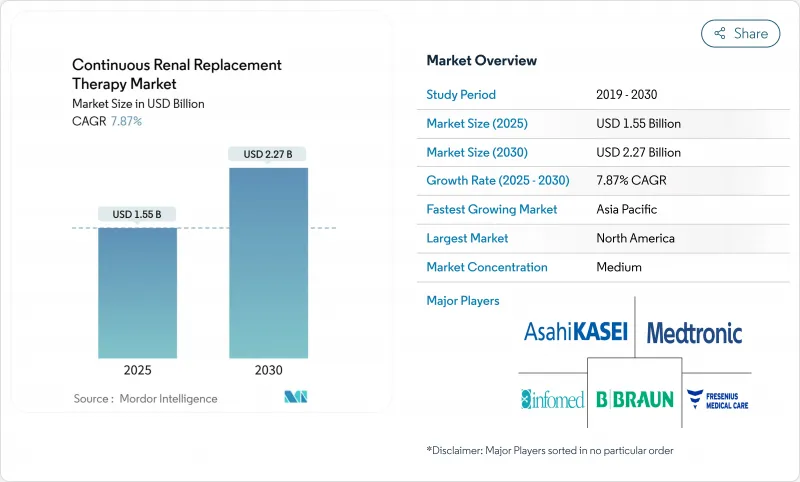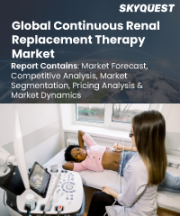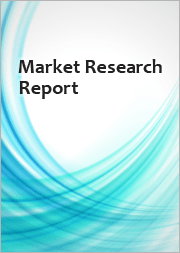
|
시장보고서
상품코드
1842655
지속적 신대체요법(CRRT) : 시장 점유율 분석, 산업 동향, 통계, 성장 예측(2025-2030년)Continuous Renal Replacement Therapy - Market Share Analysis, Industry Trends & Statistics, Growth Forecasts (2025 - 2030) |
||||||
지속적 신대체요법(CRRT) 시장 규모는 2025년에 15억 5,000만 달러로 추정되며, 예측 기간(2025-2030년)의 CAGR은 7.87%를 나타내, 2030년에는 22억 7,000만 달러에 이를 것으로 예측됩니다.

왕성한 수요는 고령화, 다질환 합병증 집단의 급성 신장 장애 부담 증가, 집중 치료실에서 패혈증 환자의 급증, 개인화 치료 계획을 위해 인공지능 투여 알고리즘을 도입하는 시스템의 꾸준한 기술 혁신에 기인합니다. ICU 입실 증가, 일회용 일회용에 의한 처치의 안전성의 향상, 입원 기간의 단축을 목표로 하는 의료 기관의 움직임은 더욱 채용에 박차를 가하고 있습니다. 휴대용 기기, 클라우드에 연결한 분석, 사이토카인 흡착막은 신장 대체뿐만 아니라 다장기 지지로 모달리티의 범위를 넓혀 투석과 급성기 의료기기의 두 분야로부터의 진입을 끌고 있습니다. 패혈증과 관련된 다장기 기능 장애가 지속적인 사용의 원동력이 되는 반면, AI 가이드에 의한 정밀 투여와 자동화는 간호사 부족으로 인한 작업 부하의 압박을 완화하는 데 도움이 됩니다.
세계의 지속적 신대체요법(CRRT) 시장 동향과 인사이트
고령화와 합병증 인구에 의한 급성 신장 장애의 발생률 상승
임상의는 집단이 고령화되고 당뇨병, 고혈압, 심혈관 질환 등의 만성 질환이 축적됨에 따라 더 많은 급성 신장 장애를 관찰하고 지속적 신대체요법(CRRT) 시장의 궤도를 높이고 있습니다. 다질환 합병 환자는 AKI 발병 후 사망률이 높아 혈행동태를 안정시키는 지속적 치료에 대한 수요가 높아지고 있습니다. 또한 심각한 질병 후 생존 기간이 길어지면 생존자는 만성 신장 질환에 노출되어 단기 치료 정책 결정이 장기 건강 관리 계획으로 이어집니다. 전자기록에서 학습한 머신러닝 모델은 크레아티닌이 상승하기 전에 고위험 환자를 확인할 수 있게 되어 신장 기능을 보호하면서 CRRT에 대한 의존도를 저하시키는 조기 개입이 가능하게 되었습니다. 동시에, 다양성의 확산은 신독성 노출을 증가시키고 예측 분석에도 불구하고 치료 곡선을 위쪽으로 유지합니다.
CRRT 장비 및 투석액 솔루션의 지속적인 기술 개선
제조업체 각 회사는 디지털 건강 도구와 고급 멤브레인을 새로운 장비에 통합하기 위해 R & D 사이클을 가속화하고 있습니다. AI를 사용하는 알고리즘은 실시간 생체 신호와 검사 값을 현장 복용량 조정으로 변환하고 체액 불균형과 용질 변동을 제한하는 정밀 투여로 경험적 프로토콜을 대체합니다. AN69ST와 같은 사이토 카인 흡착막은 신장 클리어런스에서 패혈증의 면역 조절에 이르기까지 애플리케이션을 확장하여 명확한 임상 차별화를 제공합니다. 속도 스왑이 가능한 NxStage 카트리지 익스프레스와 같은 기술은 전통적인 20분 가동 중단 시간과 비교하여 약 4분 내에 필터 교환을 가능하게 하고 치료를 계속하며 간호사의 생산성을 최적화합니다. 클라우드 기반 경보 기능과 함께 이러한 기능은 인력 배치 제약을 완화하고, 안전성을 향상시키고, 실적 데이터가 있는 공급업체에게 경쟁력을 부여합니다.
간헐적 신대체요법에 비해 CRRT의 높은 치료 비용
예산 검토 결과, 주간 지속적 체외 혈액정화(CRRT) 비용은 3,486캐나다 달러(2,541달러)에서 5,117캐나다 달러(3,730달러) 사이인 반면, 간헐적 혈액투석 비용은 1,342캐나다 달러(978달러)로 나타나 재무팀이 이용 현황을 면밀히 검토하게 되었습니다. 보험사 지급액은 현저히 차이를 보입니다: 민간 보험은 환자-월당 평균 10,149달러로, 메디케어 지출의 3배에 달하며 보상 모델을 복잡하게 만듭니다. 병원은 신장의 조기 회복으로 인한 총 케어의 절약과 치료 비용의 상승을 비교 검토하는 가치 기반의 구매 프레임 워크로 대항합니다. 공급업체는 인건비를 억제하기 위해 작업을 자동화하고 소모품과 분석을 번들로 제공하는 구독 모델을 제공함으로써 대응하고 있습니다.
부문 분석
지속적인 정맥 혈액 투석은 2024년 35.67%의 임상가들이 익숙하고 프로토콜이 널리 채택되었음을 반영하여 지속적 신대체요법(CRRT) 시장에서 가장 큰 슬라이스를 확보했습니다. CAGR 10.38%를 나타내 지속적인 정맥 혈액 여과 투석은 우수한 사이토카인클리어런스와 중분자 클리어런스를 통해 패혈성 쇼크와 고염증성 병태에 적합한 옵션이 되었습니다. 혈액 여과 투석의 지속적 신대체요법(CRRT) 시장 규모는 AI 대응 소프트웨어 모델이 대류 속도와 확산 속도를 실시간으로 미세 조정하는 동적 흐름 계산을 통합함에 따라 빠르게 확대될 것으로 보입니다.
생존율 예측 정확도가 84.8%를 달성한 머신러닝 알고리즘은 의사가 개별 생리학적 프로파일에 맞게 치료법을 선택하는 데 도움이 됩니다. 사이토카인 흡착 카트리지를 추가하는 하이브리드 회로는 면역조절이 중심인 ICU에서의 채용을 더욱 추진합니다. 한편, 지속적인 정맥 혈액 여과는 대사 조절이 용질 특이성보다 우선하는 경우 대량의 대류 간극에 유용합니다.
지역 분석
북미는 조기 AI 도입, 유리한 상환, 선도적인 제조업체의 존재로 2024년 지속적 신대체요법(CRRT) 시장 매출의 44.81%를 차지했습니다. 그러나 허리케인 및 기타 비정상적인 사태로 인해 공급망의 취약성이 드러났기 때문에 여러 생산 기지로 분산화가 진행되었습니다. 캐나다와 멕시코의 현대화 노력은 중요한 관리 관행의 표준화와 함께 판매량을 증가시킵니다.
아시아태평양은 CAGR 11.15%를 나타낼 전망입니다. 중국의 장기 지출 계획에서는 치명타 관리 제품군에 수십억 달러가 할당되었으며 인도의 국가 투석 프로그램에서는 CRRT 기능이 새로운 3차 단위에 통합되었습니다. 당뇨병과 심혈관 유병률의 상승과 인구 역학의 고령화는 수요를 확고하게 하고 있습니다. 현지 기업은 세계 OEM과 제휴하여 주입 및 소모품을 공동 생산하여 공급망의 안정화를 도모하고 있습니다.
유럽에서는 의료기술 평가를 활용하고 상환을 조정하면서 구매를 정당화함으로써 꾸준한 성장을 이루고 있습니다. CE 마킹의 경로는 최신 기기 시장 투입까지의 시간을 단축하고, 국경을 넘은 연구 프로젝트는 사이토 카인 필터의 임상시험을 가속시킵니다. 남미와 중동 및 아프리카는 인재 부족이 가까운 미래의 보급을 막는 것, 보다 광범위한 병원 건설의 과제와 연관된 초기 단계의 섭취를 나타냅니다.
기타 혜택 :
- 엑셀 형식 시장 예측(ME) 시트
- 3개월간의 애널리스트 지원
목차
제1장 서론
- 조사 전제조건과 시장 정의
- 조사 범위
제2장 조사 방법
제3장 주요 요약
제4장 시장 상황
- 시장 개요
- 시장 성장 촉진요인
- 고령화와 합병증 인구 증가에 의한 급성 신장 장애(AKI)의 발생률의 상승
- CRRT 기기 및 투석액의 지속적인 기술 개선
- 패혈증과 관련된 다장기 부전 증가가 치료 수요를 촉진
- 신흥국에서의 집중치료실(ICU) 수용 능력의 지속적인 확대
- 개별화 CRRT 투여를 위한 AI 기반 알고리즘의 채용
- 고염증 상태를 관리하는 사이토 카인 흡착 필터에 대한 관심 증가
- 시장 성장 억제요인
- 간헐적 신대체요법(IRRT)에 비해 CRRT의 치료비가 높은 것
- 디바이스 및 교환액에 관한 복잡한 규제 요건
- CRRT 투여를 위한 충분한 훈련을 받은 간호 직원의 부족
- 즉시 사용할 수 있는 프리믹스 주입의 입수에 영향을 미치는 취약한 세계 공급망
- 기술적 전망
- Porter's Five Forces 분석
- 신규 진입자의 위협
- 구매자의 협상력
- 공급자의 협상력
- 대체품의 위협
- 경쟁 기업 간 경쟁 관계의 강도
제5장 시장 규모·성장 예측(단위 : 달러)
- 모드별
- 지속적 정맥-정맥 혈액투석(CVVHD)
- 지속적 정맥-정맥 혈액여과(CVVH)
- 지속적 정맥-정맥 혈액여과투석(CVVHDF)
- 저속 지속적 초여과(SCUF)
- 부산물 유형별
- 투석액 및 대체액
- 혈액여과기 및 카트리지
- 일회용 소모품
- CRRT 시스템/모니터
- 최종 사용자별
- 병원
- 전문 신장 센터
- 외래 수술 센터(ASC)
- 재택치료
- 지역별
- 북미
- 미국
- 캐나다
- 멕시코
- 유럽
- 독일
- 영국
- 프랑스
- 이탈리아
- 스페인
- 기타 유럽
- 아시아태평양
- 중국
- 일본
- 인도
- 호주
- 한국
- 기타 아시아태평양
- 중동 및 아프리카
- GCC
- 남아프리카
- 기타 중동 및 아프리카
- 남미
- 브라질
- 아르헨티나
- 기타 남미
- 북미
제6장 경쟁 구도
- 시장 집중도
- 시장 점유율 분석
- 기업 프로파일
- Asahi Kasei Medical
- Baxter(Vantive)
- B. Braun Melsungen
- Fresenius Medical Care
- Nipro Corporation
- Medtronic
- Toray Medical
- Infomed SA
- Medica SpA
- Cytosorbents Corp.
- Jafron Biomedical
- Medical Components Inc.
- Ningbo David Medical
- Rockwell Medical
- Torayvino Hemodiafiltration
- SeaStar Medical
- Becton, Dickinson and Company
- Terumo Blood & Cell Technologies
- Outset Medical
- Genrui Biotech
제7장 시장 기회와 전망
KTH 25.10.29The Continuous Renal Replacement Therapy Market size is estimated at USD 1.55 billion in 2025, and is expected to reach USD 2.27 billion by 2030, at a CAGR of 7.87% during the forecast period (2025-2030).

Robust demand stems from the rising burden of acute kidney injury in aging, multimorbid populations, surging sepsis cases in intensive-care units, and steady innovation in systems that now deploy artificial-intelligence dosing algorithms for individualized therapy planning. Higher ICU admissions, greater procedural safety thanks to single-use disposables, and an institutional push to shorten inpatient stays further energize adoption. Portable machines, cloud-linked analytics, and cytokine-adsorbing membranes are broadening the modality's reach beyond renal replacement into multimodal organ support, attracting entrants from both dialysis and acute-care device segments. Sepsis-related multi-organ dysfunction drives persistent use, while AI-guided precision dosing and automation help mitigate workload pressures created by nursing shortages.
Global Continuous Renal Replacement Therapy Market Trends and Insights
Rising Incidence of Acute Kidney Injury Due to an Aging and Comorbid Population
Clinicians observe more acute kidney injury as populations age and accumulate chronic conditions such as diabetes, hypertension, and cardiovascular disease, elevating the continuous renal replacement therapy market trajectory. Multimorbid patients exhibit higher mortality once AKI develops, intensifying demand for continuous therapies that provide hemodynamic stability. Extended survival after critical illness also exposes survivors to chronic kidney disease, linking short-term therapy decisions to long-term healthcare planning. Machine-learning models trained on electronic records can now identify high-risk patients before creatinine rises, enabling earlier intervention that may lower dependence on CRRT while protecting renal function. At the same time, widespread polypharmacy raises nephrotoxic exposure, keeping the treatment curve upward despite predictive analytics.
Continuous Technological Improvements in CRRT Equipment and Dialysate Solutions
Manufacturers speed R&D cycles to embed digital health tools and advanced membranes in new machines. AI-powered algorithms translate real-time vital signs and lab values into on-the-fly dose adjustments, replacing empiric protocols with precision dosing that limits fluid imbalance and solute swings. Cytokine-adsorbing membranes such as AN69ST extend use from renal clearance to immunomodulation in sepsis, offering clear clinical differentiation. Technologies like the NxStage Cartridge Express with Speedswap allow a filter exchange in about four minutes compared with conventional 20-minute downtime, keeping therapy continuous and optimizing nurse productivity. Coupled with cloud-based alerts, these functions ease staffing constraints and improve safety, giving vendors with proven outcome data a competitive edge.
Higher Treatment Costs of CRRT Compared to Intermittent Renal Replacement Therapy
Budgetary reviews reveal weekly CRRT outlays between CAD 3,486 (USD 2,541) and CAD 5,117 (USD 3,730) versus CAD 1,342 (USD 978) for intermittent hemodialysis, prompting finance teams to scrutinize utilization. Insurer payments diverge sharply: private plans average USD 10,149 per patient-month, tripling Medicare outlays and complicating reimbursement models. Hospitals answer with value-based purchasing frameworks that weigh total-care savings from faster renal recovery against higher procedural costs. Vendors counter by automating tasks to curb labor expense and by offering subscription models that bundle disposables and analytics.
Other drivers and restraints analyzed in the detailed report include:
- Increase in Sepsis-Related Multi-Organ Dysfunction Fueling Therapy Demand
- Ongoing Expansion of Intensive Care Unit Capacity in Emerging Economies
- Shortage of Adequately Trained Nursing Staff for CRRT Administration
For complete list of drivers and restraints, kindly check the Table Of Contents.
Segment Analysis
Continuous venovenous hemodialysis secured the largest slice of the continuous renal replacement therapy market at 35.67% in 2024, reflecting clinician familiarity and broad protocol adoption. Continuous venovenous hemodiafiltration, with its 10.38% CAGR, benefits from superior cytokine and middle-molecule clearance, making it the preferred choice for septic shock or hyper-inflammatory presentations. The continuous renal replacement therapy market size for hemodiafiltration is set to rise rapidly as AI-enabled software models integrate dynamic flow calculations that fine-tune convection and diffusion rates in real time.
Machine-learning algorithms achieving 84.8% prediction accuracy for survival help physicians align modality choice with individual physiologic profiles. Hybrid circuits that add cytokine-adsorbing cartridges further push adoption in ICUs where immunomodulation is central. Slow continuous ultrafiltration retains a clinical niche in fluid-overloaded cardiac patients, whereas continuous venovenous hemofiltration remains useful for high-volume convective clearance when metabolic control overrides solute specificity.
The Continuous Renal Replacement Therapy Market Report is Segmented by Mode (Continuous Venovenous Hemodialysis, Continuous Venovenous Hemofiltration, and More), Product Type (Dialysate & Replacement Fluids, Hemofilters & Cartridges, and More), End User (Hospital, and More), and Geography (North America, Europe, Asia-Pacific, Middle East and Africa, South America). The Market Forecasts are Provided in Terms of Value (USD).
Geography Analysis
North America generated 44.81% of continuous renal replacement therapy market revenue in 2024 thanks to early AI adoption, favorable reimbursement, and the presence of leading manufacturers. Hurricanes and other extreme events, however, exposed supply chain fragility, prompting diversification across multiple production hubs. Canada's and Mexico's modernization efforts add incremental volume as they standardize critical-care practices.
Asia-Pacific leads growth at 11.15% CAGR. China's long-term spending plan allocates billions to critical-care suites, and India's national dialysis program embeds CRRT capability inside new tertiary units. Rising diabetes and cardiovascular prevalence, coupled with aging demographics, solidify demand. Local companies partner with global OEMs to co-produce fluids and disposables, insulating supply chains.
Europe delivers steady gains, leveraging health-technology assessments to justify purchases while aligning reimbursement. CE marking pathways shorten time-to-market for updated machines, and cross-border research projects accelerate cytokine-filter trials. South America and the Middle East & Africa show early-stage uptake tied to broader hospital-build agendas, though human-resource gaps temper near-term penetration.
- Asahi Kasei Medical
- Baxter (Vantive)
- B. Braun
- Fresenius
- Nipro
- Medtronic
- Toray Medical
- Infomed
- Medica
- Cytosorbents Corp.
- Jafron Biomedical
- Medical Components Inc.
- Ningbo David Medical
- Rockwell Medical
- Torayvino Hemodiafiltration
- SeaStar Medical
- Beckton Dickinson
- Terumo Blood & Cell Technologies
- Outset Medical
- Genrui Biotech
Additional Benefits:
- The market estimate (ME) sheet in Excel format
- 3 months of analyst support
TABLE OF CONTENTS
1 Introduction
- 1.1 Study Assumptions & Market Definition
- 1.2 Scope of the Study
2 Research Methodology
3 Executive Summary
4 Market Landscape
- 4.1 Market Overview
- 4.2 Market Drivers
- 4.2.1 Rising Incidence of Acute Kidney Injury (AKI) Due to an Aging and Comorbid Population
- 4.2.2 Continuous Technological Improvements in CRRT Equipment and Dialysate Solutions
- 4.2.3 Increase In Sepsis-Related Multi-Organ Dysfunction Fueling Therapy Demand
- 4.2.4 Ongoing Expansion of Intensive Care Unit (ICU) Capacity in Emerging Economies
- 4.2.5 Adoption of AI-Based Algorithms for Personalized CRRT Dosing
- 4.2.6 Growing Interest in Cytokine-Adsorbing Filters for Managing Hyper-Inflammatory States
- 4.3 Market Restraints
- 4.3.1 Higher Treatment Costs of CRRT Compared to Intermittent Renal Replacement Therapy (IRRT)
- 4.3.2 Complex Regulatory Requirements for Devices and Replacement Fluids
- 4.3.3 Shortage of Adequately Trained Nursing Staff for CRRT Administration
- 4.3.4 Fragile Global Supply Chains Affecting Availability of Ready-To-Use Premixed Fluids
- 4.4 Technological Outlook
- 4.5 Porter's Five Forces Analysis
- 4.5.1 Threat of New Entrants
- 4.5.2 Bargaining Power of Buyers
- 4.5.3 Bargaining Power of Suppliers
- 4.5.4 Threat of Substitutes
- 4.5.5 Intensity of Competitive Rivalry
5 Market Size & Growth Forecasts (Value in USD)
- 5.1 By Mode
- 5.1.1 Continuous Venovenous Hemodialysis (CVVHD)
- 5.1.2 Continuous Venovenous Hemofiltration (CVVH)
- 5.1.3 Continuous Venovenous Hemodiafiltration (CVVHDF)
- 5.1.4 Slow Continuous Ultrafiltration (SCUF)
- 5.2 By Product Type
- 5.2.1 Dialysate & Replacement Fluids
- 5.2.2 Hemofilters & Cartridges
- 5.2.3 Disposables
- 5.2.4 CRRT Systems / Monitors
- 5.3 By End User
- 5.3.1 Hospitals
- 5.3.2 Specialty Renal Centres
- 5.3.3 Ambulatory Surgical Centres
- 5.3.4 Home Care Settings
- 5.4 By Geography
- 5.4.1 North America
- 5.4.1.1 United States
- 5.4.1.2 Canada
- 5.4.1.3 Mexico
- 5.4.2 Europe
- 5.4.2.1 Germany
- 5.4.2.2 United Kingdom
- 5.4.2.3 France
- 5.4.2.4 Italy
- 5.4.2.5 Spain
- 5.4.2.6 Rest of Europe
- 5.4.3 Asia-Pacific
- 5.4.3.1 China
- 5.4.3.2 Japan
- 5.4.3.3 India
- 5.4.3.4 Australia
- 5.4.3.5 South Korea
- 5.4.3.6 Rest of Asia-Pacific
- 5.4.4 Middle East & Africa
- 5.4.4.1 GCC
- 5.4.4.2 South Africa
- 5.4.4.3 Rest of Middle East & Africa
- 5.4.5 South America
- 5.4.5.1 Brazil
- 5.4.5.2 Argentina
- 5.4.5.3 Rest of South America
- 5.4.1 North America
6 Competitive Landscape
- 6.1 Market Concentration
- 6.2 Market Share Analysis
- 6.3 Company Profiles (includes Global level Overview, Market level overview, Core Segments, Financials as available, Strategic Information, Market Rank/Share for key companies, Products & Services, and Recent Developments)
- 6.3.1 Asahi Kasei Medical
- 6.3.2 Baxter (Vantive)
- 6.3.3 B. Braun Melsungen
- 6.3.4 Fresenius Medical Care
- 6.3.5 Nipro Corporation
- 6.3.6 Medtronic
- 6.3.7 Toray Medical
- 6.3.8 Infomed SA
- 6.3.9 Medica SpA
- 6.3.10 Cytosorbents Corp.
- 6.3.11 Jafron Biomedical
- 6.3.12 Medical Components Inc.
- 6.3.13 Ningbo David Medical
- 6.3.14 Rockwell Medical
- 6.3.15 Torayvino Hemodiafiltration
- 6.3.16 SeaStar Medical
- 6.3.17 Becton, Dickinson and Company
- 6.3.18 Terumo Blood & Cell Technologies
- 6.3.19 Outset Medical
- 6.3.20 Genrui Biotech
7 Market Opportunities & Future Outlook
- 7.1 White-space & Unmet-need Assessment

















